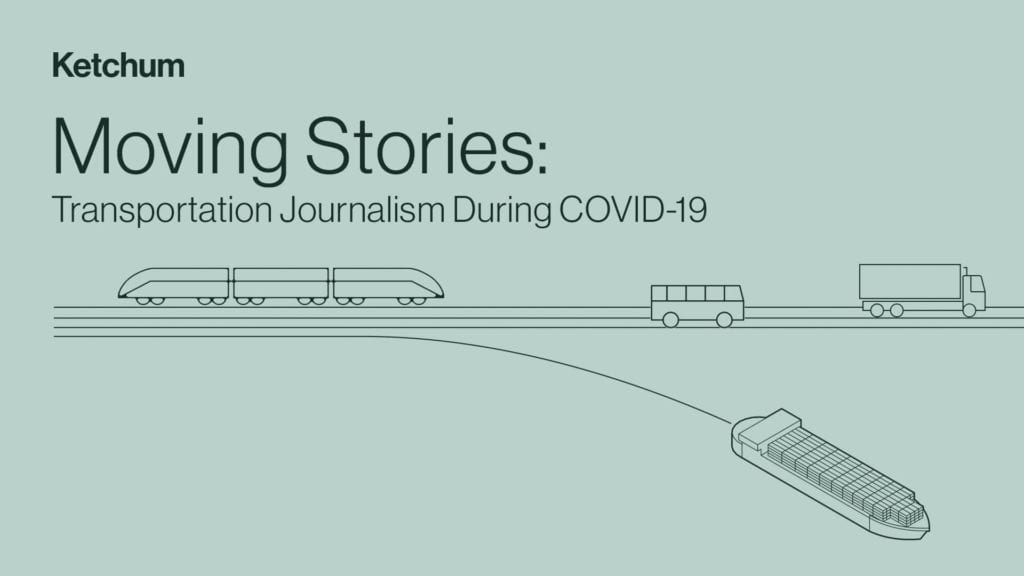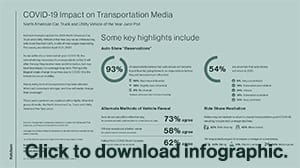Every year, North American auto shows draw millions of visitors across the country and generate even more visibility through widespread media coverage highlighting the craziest concepts and coolest new cars that will hit the road in the future. Yet even before the first-ever spring North American International Auto Show in Detroit was cancelled in late March, we knew auto shows were changing.

COVID-19 had already delayed or caused the cancellation of other major shows in the U.S. and globally. These are predictable content generators for brands and media alike—filling thousands of pages and pixels and setting editorial agendas as new trends emerge. Ketchum set out to discover how COVID-19 may change the medium- and long-term editorial direction for top transportation media, and if auto shows could survive the virus.
Through a poll of select media and an insightful panel conversation that followed, we uncovered that, like many trends, COVID-19 will likely accelerate changes already underway. More transportation news and new vehicles will likely debut through stand-alone events and virtual reveals. But the physical show environment offers something that’s really hard to replicate digitally.
“The thing you don’t get virtually is any chance at a side conversation,” said automotive freelancer Elana Scherr during Ketchum’s panel. “You don’t get that spur-of-the-moment conversation with an engineer you happen to be standing with, where you find out some interesting small fact that leads to a really exciting story. And any question you ask virtually, everyone else is going to get the answer as well. As a writer and storyteller, I would like to have a story that someone else doesn’t have.”
The side conversation is absent from the virtual programming that everyone has rushed to execute. Media hinge much of their coverage on the unique details, insights and context derived from the peripheral.
And there’s more evidence that auto shows will remain a significant part of the media and consumer landscape.
“There’s no substitute for live TV, and the auto shows are so important for live broadcast,” said Javier Mota, Autoproyecto.com.
“These shows are so important for just being there and having a show as the backdrop,” commented Steven Ewing, Roadshow by CNET. “You have everything in one place at one time.”
But Ewing also made the case for growing stand-alone events. “A lot of automakers have found success doing off-site reveals not necessarily tied to an auto show cycle where, if you are the one big debut that week, you can own the news cycle… For us, we look at it and we [ask], how can we hit it four different ways… so we have four stories right as the embargo lifts.”
There’s no crystal ball, but this seems probable: Shows will outlive this virus, as will the PR and media opportunities that come with them.
“I think they will be a part of the landscape for a long time to come, and hopefully COVID won’t be,” said Gary Witzenburg, contributor, freelancer and president of the North American Car, Truck and Utility Vehicle of the Year award.
Poll insights and takeaways
Ketchum Analytics fielded a poll in April to the North American Car, Truck and Utility Vehicle of the Year jury. With slightly more than half the jury responding, the information was directional:
- Nearly three-quarters of respondents agreed that auto shows offer an effective way to communicate news.
- Yet more than half this group of media said off-site, stand-alone reveals were actually better for manufacturers.
- And 62% said that fallout from COVID-19 would increase use of virtual events.
- Journalists nearly unanimously felt the auto shows would lose some degree of influence, and split on the likelihood of a resurgence in 2021.
A summary of survey findings is linked here.
Ketchum’s research and insights are part of our ongoing effort to gauge the media environment during and post this pandemic. If you would like to review our full suite of tools and discuss further research for your brand or industry, please contact me.
One final response from our panelists:
Where will we be next year at this time?
Elana: If there is one positive about how the shutdown of press trips and auto shows has affected the industry, it’s that it has made it very clear which reporters and outlets have creative teams thinking about stories to tell, and which are just waiting for a press release and presentation. Maybe we’ll come out of this as a stronger, more interesting, more relevant community.
Gary: As an incurable (but realistic) optimist, I firmly believe that this virus will be history—not totally gone, but very manageable (like all before it) with appropriate precautions—and we’ll find ourselves back to near normal before too much longer, provided the economy can recover.
Steven: I don’t think the general flow of the industry will change too much year over year, but so much of it depends on what happens over the next six-ish months as the country works to control the pandemic… Since there’s no definite end to this pandemic timeline, it’s really hard to say.




